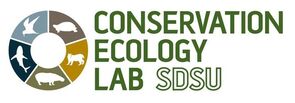Innovative approaches to Health Assessment: desert tortoises (Gopherus agassizii)
Working together with Dr. Keith Miles at the University of California-Davis and USGS, we are initiating a new project to understand the influences of human disturbances on the ecology, health, and survival of desert tortoises (Gopherus agassizii) within the Mojave Desert. Tortoises are subjected to a myriad of ecological and environmental stressors as human development and land use practices increase across the Mojave Desert. Despite more than 15 years of intensive efforts to improve conservation for desert ecosystems, tortoises continue to decline.
Understanding the specific causal effects of population decline and animal health in tortoise populations has been difficult, as tortoises are simultaneously exposed to a wide variety of these environmental stressors and seldom display clinical signs of physiological perturbations. Current health and disease screening methods often inadequately diagnose the clinical and physiological health conditions of wild tortoises, making it difficult to identify specific environmental conditions linked to declining animal health.
Within the last year, Kristina Drake (Ph.D student) and her colleagues have developed a species-specific quantitative real time polymerase chain reaction (qPCR) assay to measure differential gene transcription levels of multiple genes in the desert tortoise. This panel included genes that are fundamental to immune function, pathogen defense, and metabolism. The success of this qPCR assay and gene sequencing research provides an opportunity to use genetics and associated protein production to identify stressed or diseased animals before clinical disease manifestations. Selecting genes and proteins specific to immune responses with the potential to be influenced by biological, physical, or environmental stressors may provide information on the type and magnitude of stressors present in the animal’s habitat.
This multifaceted project is designed to 1) expand our understanding of how reptile species such as the desert tortoise respond physiologically to environmental perturbations, 2) incorporate innovative molecular diagnostics to advance our knowledge of wildlife health and disease, and 3) identify specific environmental factors that are needed to improve habitat conditions and overall health for the threatened desert tortoise.
Understanding the specific causal effects of population decline and animal health in tortoise populations has been difficult, as tortoises are simultaneously exposed to a wide variety of these environmental stressors and seldom display clinical signs of physiological perturbations. Current health and disease screening methods often inadequately diagnose the clinical and physiological health conditions of wild tortoises, making it difficult to identify specific environmental conditions linked to declining animal health.
Within the last year, Kristina Drake (Ph.D student) and her colleagues have developed a species-specific quantitative real time polymerase chain reaction (qPCR) assay to measure differential gene transcription levels of multiple genes in the desert tortoise. This panel included genes that are fundamental to immune function, pathogen defense, and metabolism. The success of this qPCR assay and gene sequencing research provides an opportunity to use genetics and associated protein production to identify stressed or diseased animals before clinical disease manifestations. Selecting genes and proteins specific to immune responses with the potential to be influenced by biological, physical, or environmental stressors may provide information on the type and magnitude of stressors present in the animal’s habitat.
This multifaceted project is designed to 1) expand our understanding of how reptile species such as the desert tortoise respond physiologically to environmental perturbations, 2) incorporate innovative molecular diagnostics to advance our knowledge of wildlife health and disease, and 3) identify specific environmental factors that are needed to improve habitat conditions and overall health for the threatened desert tortoise.


